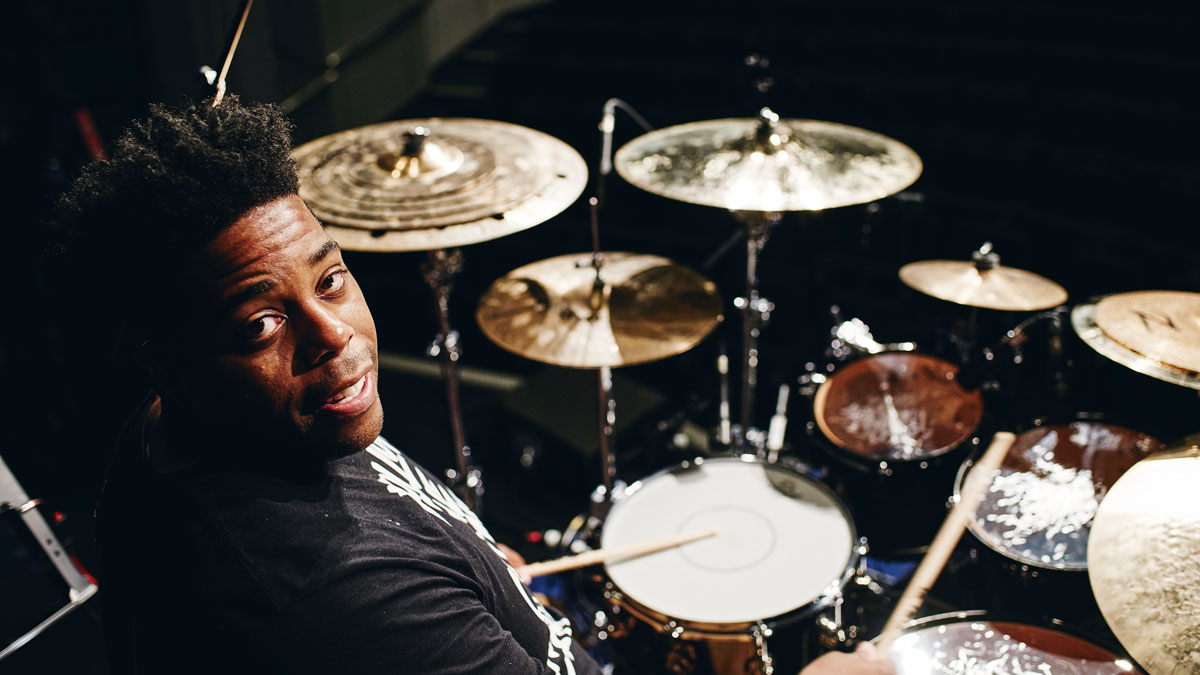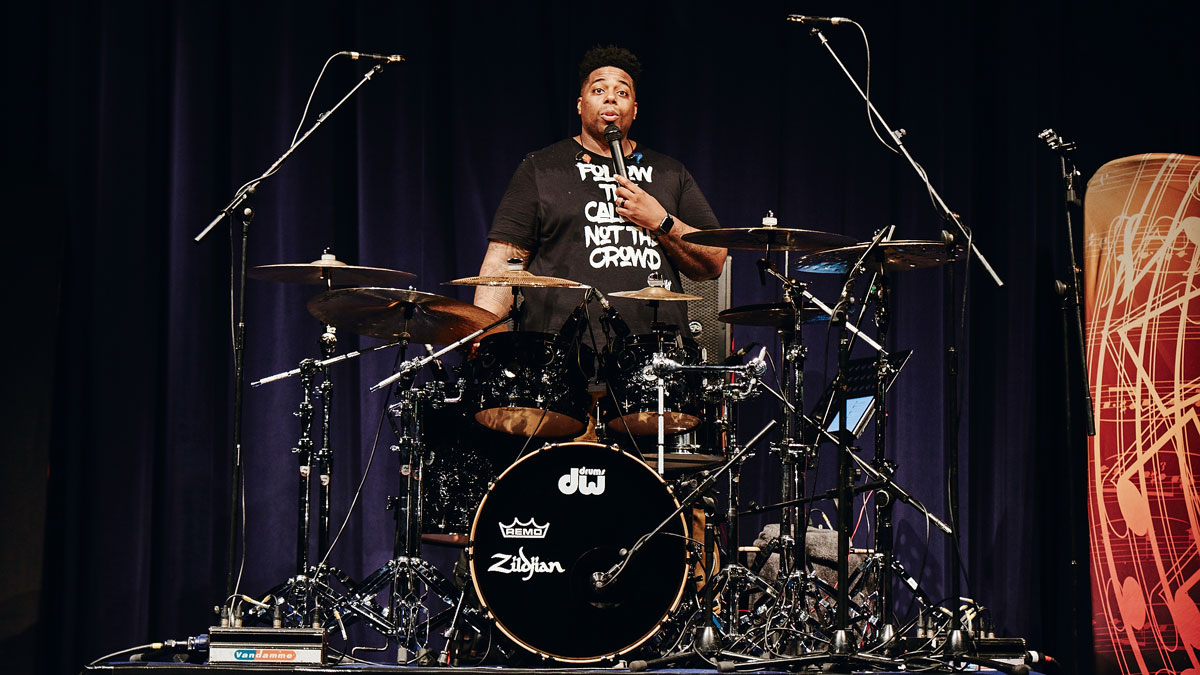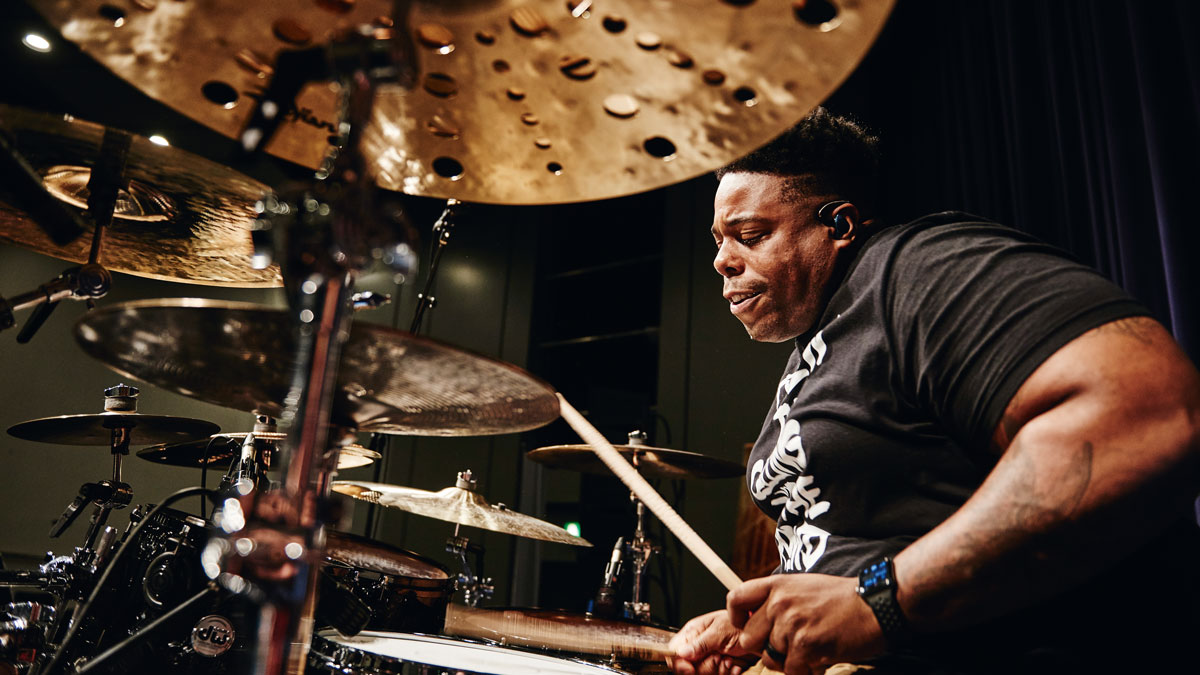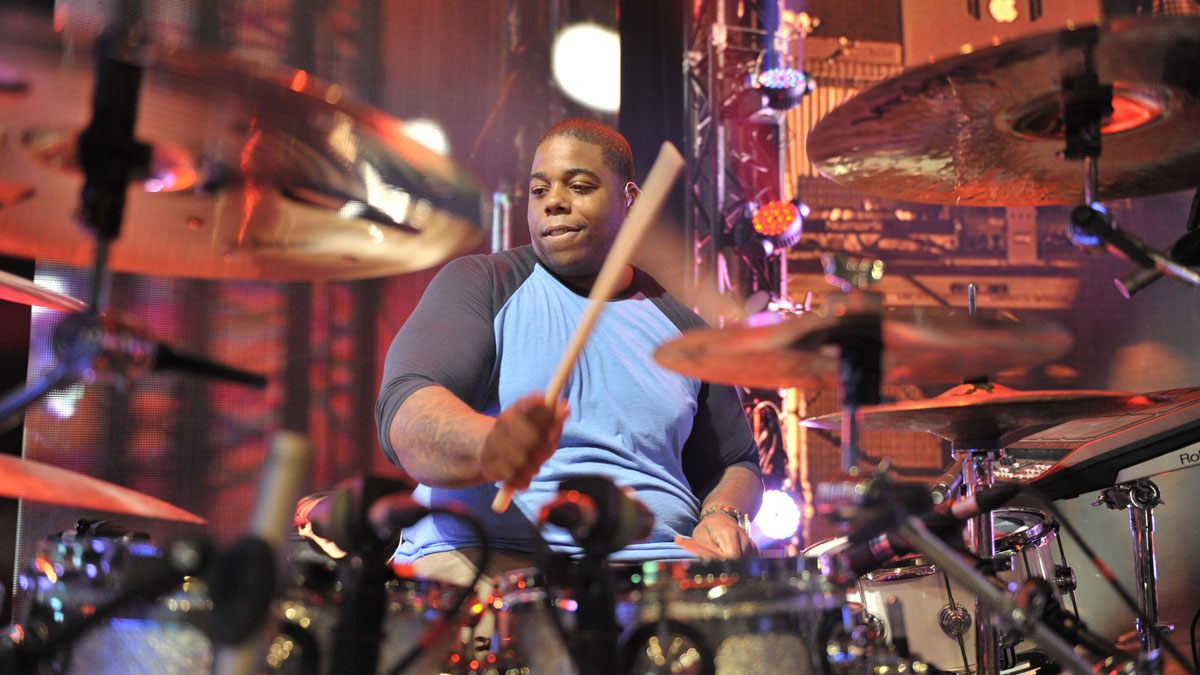Aaron Spears: "Back then I had no idea that that was like a 9/8 time signature, it was just a song that we played at church"
Wisdom galore from the r’n’b king

The r'n'b king
Aaron Spears is one of those players who seem almost to have been born with sticks in their hands; a formidable education in drumming provided, like so many modern American players, by playing in church, itself giving rise to the kind of insane chops and innate musicality that drops jaws for drummers and non-drummers alike.
Born and raised in Washington DC, Aaron’s love of the drums and music has given rise to an inspirational story that began way back in church, led to him backing r’n’b superstar Usher and touring the world with pop superstar Ariana Grande - a tour that tragically included the terrible night of the Manchester Arena suicide bombing that killed 22 and injured many more music fans - and to the moving One Love tribute that he and Ariana’s band led at Old Trafford Cricket Ground just a couple of weeks later.
We sit down with Aaron in a backstage room at London’s Olympia, where he has just put on a wonderful clinic performance on the London Drum Show’s Masterclass stage. The next day he will boss the Show’s Main Stage, demonstrating power, precision and groove in equally impressive measure, and sit in for a spot of double drumming with his friend Kaz Rodriguez too. The packed auditorium will of course, be suitably awed...
You began drumming at very young age…
“My parents say that I started at like three or four, no way I can remember that. I’m 41 now. I do remember the first time that I played I was probably maybe six or seven. My dad has a really cool picture of me in a suit at church playing by myself.
"Before then I would say I vaguely remember having to sit on someone’s lap while they played hi-hat and a pedal because I couldn’t reach it and I would play the stuff up-top, which was cool, but the first time that I remember actually busting out and playing on my own I was probably maybe six or seven, at church.”
Did you learn a lot from the other church drummers?
“Yeah, so many… they were local guys in my church, the way that my church was set up it was a lot of young guys that were around my age and older, and everybody wanted to play drums.
"On the first row in the church right by the drums, there was like maybe at least four or five guys with sticks in hand, air drumming because we were waiting our turn to be able to play, and we all looked up to the guy that was the head drummer, and we all wanted to be able to play like him.
"During that time, trouser pants were a little bit wider and he would roll the leg of his pants up so they didn’t get caught in the beater, so even if our pants weren’t wide we still would roll our pants up so we could play like this guy!
"But it was him, and people that played with other local choirs in the area, that we just watched so intensely to mimic and be like them.”
What did that teach you about the drums that you were able to use later on?
“I’m so thankful for the opportunities that I had back there at church because it taught me so much, it taught me different styles before I knew what different styles were.
"Back then I was playing stuff in nine - I had no idea that that was like a 9/8 time signature, it was just a song that we played at church, it was a church song but until I got older, I had no idea that this was like a funk tune or that this song has like a Caribbean vibe, I had no idea what that even was.
"To me these were just songs we were playing. Until I got older and reflecting back, it was like, oh, this feels just like this from the church, this feels like what I played here.
"And it taught me to play my role in a band, and be with other musicians, it also taught be how to be the support for an artist. Back in those days it would be the person that was leading the song, like in the choir, the soloist, and the choir could be the equivalent of background singers, it taught me musical structure at a very young age.”
I think that Gospel Chops, people put the label on it but I feel that it’s just about expression, it’s not really about a genre of music or a style, or a way to play
A lot is said about this idea of ‘Gospel Chops’ but it seems to me that it’s really more about musicality than chops?
“I think that Gospel Chops, people put the label on it but I feel that it’s just about expression, it’s not really about a genre of music or a style, or a way to play. They’re just chops - ways to express or ways to solo.
"Just like you’ll see a cat playing fusion chops, or a cat playing funk chops - those are maybe tools that they use in those particular genres.”
So then later you learned to read music and started playing jazz?
“Growing up in middle school and in high school is where I started to pick up understanding and learning notation and stuff, like just to be able to play songs in jazz band or in concert band or in marching band.
"For me, that was an eye opener because there was a lot of stuff that I had been playing all my life, or as a kid, that opened my mind and gave me an understanding of what it is I’m playing as far as it being on the page.”
And then of course, you discovered the fusion drummers...
“After high school is when I got hip to Weckl, Vinnie and Dennis [Chambers], Steve Gadd, Omar Hakim - these players were immortalised on video tape by DCI. Before they became Hudson Music they were called DCI Music Video and they made incredible instructional videos of so many incredible players.
"I remember seeing Burning For Buddy with Vinnie, and Dave Weckl and Steve Gadd played together, plus the one with Dennis Chambers, Gregg Bissonette and Louie Bellson where they played together. They also played with Buddy’s band, and then there were the instructional tapes from Dennis, instructional tapes from Dave Weckl and Omar Hakim… and it just really opened up my mind to a different way of playing drums.
"In church, cats weren’t playing these huge open solos like that, it was really just the foundation of the groove and just doing enough to make the music feel good. It was tapes that really opened up my mind to a whole level of playing.”

Making waves
So when did you first realise you could make money playing drums?
“I was maybe 19, I would say, where I really felt that nothing else made me feel the way that drums do. Nothing else made me satisfied. I was just a kid but I knew that when I sat down to play drums, this was like my sanctuary. This was like my happy space.
"It’s funny because even as a kid, I remember I would get in trouble in school, I was just being mischievous, and mom would say, ‘No TV!’ And I was like, cool… I would act as though it was a big deal: ‘Oh no, mom, I wanna watch He-Man!’ and as long as she said no TV or no going outside, cool, because I would just play drums and have fun and it didn’t phase me.
"Until she got smart, and she was like, ‘Give me all the sticks!’ And she’d take the foot pedal, because even then if she took the sticks away I would try and play with hangers or whatever, but she started taking things away that I need to be able to play.
"Drums was just my drive. So at 18 I had no idea how it was going to happen, if I was going to be able to play professionally, but I knew that that was something I wanted to do.”
I was working, man, I had all kind of jobs
How did you come to join Usher’s band?
“I was playing with this band called the Gideon Band from DC. The Gideon Band was like a gospel band, like an Earth, Wind & Fire kind of vibe, the band were like nine guys, two singers, organ, keys - a main keyboard player and an auxiliary keyboard player - bass, guitars, percussion, drums... It was like we fashioned ourselves after bands that we loved like Earth, Wind & Fire and Mint Condition. We just aspired to be like those guys.
"So in 1999 I made a recording with them and the recording afforded us the opportunity to be able to travel up and down the East Coast playing various places, and it was during this time that I started to meet more and more people who were doing what it is I wanted to do.
"And so a good friend of mine, Gerald Heyward, he was listening to the recording of the Gideon Band, and Usher’s Musical Director Valdez Brantley walked into his hotel room because they were friends and were hanging out, and the music was on and playing in the back and Valdez asked Gerald, ‘What are you listening to, who’s this on drums?’
"And Gerald was like oh that’s my friend Aaron from DC, and he said Usher’s looking for a new drummer, we need someone, we’re going to have auditions, do you think he’d be interested?
"They called me up and asked me to send in a video of me playing. I sent in my tape. It was one of maybe a hundred or so that came in, and they selected me to be his drummer.”
You still at this point hadn’t given up the day job…
“I was working, man, I had all kind of jobs. Before the gig I worked at a department store selling suits, and in a shoe stock room. I worked at this law firm, in their reprographics - like a copy centre making copies of documents for lawyers. I did some coding on computers, I did lots of different things.
"I couldn’t believe I got the call, to the point where I didn’t know how solid it was. I heard so many different stories about how fickle it was and I went to my job and I told them, ‘Look, I got the call and this is something I really want to do, I want to go on tour and be a musician, and I want to take a leave of absence.’
"I told them I’d be gone for three months or so and that I’d be back and we’ll see what happens from there. And they gave it to me, they gave me the leave of absence, held my job for me.
"I went out on tour, toured Europe - that was 2003, 2004 - came through Europe, came to the UK, and when the gig was over I went back to my job.

Finding inspiration
What can you tell our readers that would help them feel inspired even if they hit a wall in their playing?
“I must say that when you get in those ruts, and you’re not feeling so inspired, sometimes you can find inspiration just in life and in balance. I think it’s important to be able to, of course, play - but sometimes it’s important just to step away; just to do normal everyday things, make family time or take a walk or go work out and then maybe come back to playing, but find the inspiration within you.
"And I think that a lot of times balance helps to make that come to life, and I think getting out and doing different things outside of drums and outside of music, when you come back it kind of refreshes you and gives you a whole new love and appreciation for it. So, just have fun, man, try not to take it so serious, don’t get caught up in playing for ‘likes’.
"This generation now, it’s so crazy because so many people are recording themselves and playing for likes on Instagram or for likes on Facebook. Don’t do it for that, man, play because you like it, play because you’re having fun, play it because you enjoy it. Let that be your fuel, to be able to do what it is that you do.”
We loved what you said in your London Drum Show Masterclass earlier about the importance of fluidity, and creating a flow to your chops and soloing licks…
“As you grow and you learn and you develop, certain things like that are important, it’s important to make sure things are tight in the same way you work on timing and playing ‘2’ and ‘4’, I think it’s also important that when you do play things, play rudiments and stuff like that, to make sure that those things are tight and seamless, and the only way you can go about making that happen is from playing and practising.”
What does a big pop gig like Ariana Grande call for from the drummer?
“It’s important on gigs like that to play exactly what the artist is comfortable with. Every gig is going to be different because every artist is going to be different, so there may be times when the artist is going to want the drumming to be more expressive and play more fills or play more rolls or play more cymbals, more crashes, it’s up to you to be like a chameleon, to be able to give the artist what it is that each particular situation calls for.
"Ariana liked the music to sound like the record primarily, she didn’t want to hear her songs and be like, what song is that? She wants the drum pattern to be the drum pattern from the record. She wants the hi-hat to be familiar for her. And what we play is the foundation for the artist to be able to sing over.
"And in those particular situations it’s important to be able to give them what it is that they want. But at the same time it’s important for you to be able to be who you are as well, and that’s where the trick comes in.
"Some people make the mistake of doing too much or being too much, and that takes away from the music, and in situations like that you’ll find yourself doing that at home! Because it’s not what the artist wants, or it’s not what the Musical Director wants, so you have to be able to communicate effectively to find out exactly what it is they do want.
"There’s nothing wrong with dialling what you do back a bit and then asking them, do you want more here? And then giving them more. It’s just about healthy communication.”
What kind of set-up did you have on the Ariana Grande gig?
“So on that gig what I was using was a basic five piece kit, 14" snare, 10" and 12" rack tom, 16" floor tom, 22" kick drum but I also had a side snare that was detuned and really, really deep, really fat, then I also had a 12"x4" snare that was tuned really high because there were some songs that called for that.
"It depends on what the music was. I tried to make sure that my drums represented acoustically what sounded good with the records, and I also had my Yamaha Multipad so I could trigger the sounds that are not acoustic, like handclaps, 808 snares or different things that I would need in order to make sure that the integrity of the music is what it was.”

Returning to Manchester
How do you stay sane on the big world tours where maybe you’re away for months on end? Are you able to get out and see the places you’re playing?
“Yeah, even though sometimes it’s not safe… it’s so funny to see how the world is changing, you know? Now you go out sightseeing in these amazing places that have been created for years and years and years and you never had to think twice about looking over your shoulder or watching, oh this bag is over there, nobody’s by it, what’s going on?
"You never had to think about that before, now in this day and time you have to think about those things. But, even still I’m thankful for the opportunity to be able to go out and see the wonders of the world.
"The other day I was at Buckingham Palace just kind of chilling, and it’s just cool to see, this is where the Queen spends some of her time, for as long as I’ve been alive she’s been the Queen, and seeing her on television, her regalness and just the way that she’s been so amazing for here [the UK]; a woman of class and dignity, and to be able to stand outside Buckingham Palace which is historic and watch that and just kind of check it out and see it first hand is incredible.
"I’m thankful to be able to do that, and in so many different countries, to be able to see so many different cool things.”
The Manchester Arena bombing must have been a terrible experience personally for you, how did you and the band pick yourselves up after something like that?
“It was wild, man, because music is one of those things that we use to be able to transport people from their everyday. You know, like you’re having a bad day and you listen to your favourite song it can pick you up, or you had a rough week and your concert’s coming to town, it totally takes you away from that.
"So for us to be able to do that, that day, that concert, and then for the bombing to happen, man, it really just… it gutted us so bad because these people were coming here to enjoy themselves. And they had a fantastic time, you could tell, people were just partying and dancing and just enjoying themselves, and then for that to turn to chaos, man. It just really just messed us up because they wouldn’t even have been there if it wasn’t for the tour coming there.
"But we just pulled together as a unit, the whole tour, and we spent time talking about everything that happened, and everyone was on board with wanting to do something for Manchester. So we were thankful that everything came together the way that it did and we were able to just give some life, really, and give a little bit of fun to the people there.”
What’s the next big thing for you?
“For me right now I don’t really have anything per se going on at this particular moment, I have a couple of clinics going on but apart from that I just want to chill and see what the next thing is.
"I want to spend some time with my family, I’ve been gone pretty much this whole year, so for me I’m just going to spend some time at home, chill out, spend some time with my son, with my wife and just enjoy it while I can and we’ll see what the next call is.”